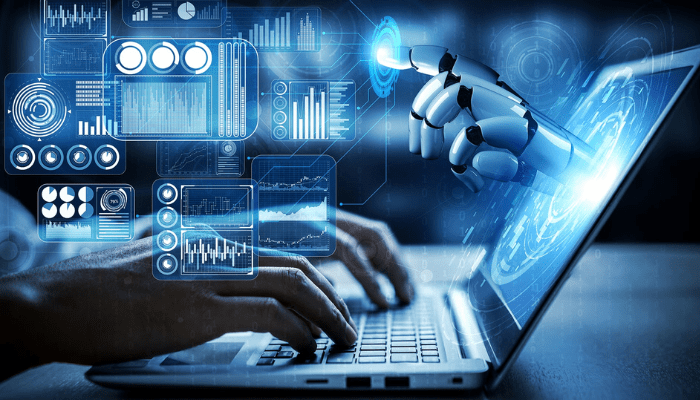How AI is Transforming the Industry Across Different Sectors
Artificial Intelligence (AI) is no longer just a thing from futuristic movies. It is present in our lives, changing the way companies work and how we consume products and services.
Advertising
But what’s behind this revolution? And how is it really transforming industries? Let’s explore this topic in a simple and direct way, without all those complicated terms, to understand how AI is shaping the future.
What is Artificial Intelligence and How Does It Work?
Advertising
Starting with the basics: Artificial Intelligence is a technology that makes machines “think” and solve problems like humans. Of course, they don’t have feelings or consciousness (at least not yet!), but they can learn, make decisions, and even predict things based on data.
Have you ever noticed how Netflix recommends a movie that feels like it was made just for you? Or when Waze suggests the best route to avoid traffic? That’s AI in action! All of this is possible because these systems process massive amounts of information and use mathematical models to make quick and accurate decisions.
Advertising
The main areas behind AI are:
- Machine Learning: Teaching machines to learn independently by analyzing data and improving over time.
- Neural Networks: A type of “artificial brain” that tries to mimic the way our brain works.
- Big Data: The foundation of it all. It’s the enormous volume of data that AI analyzes to find patterns and trends.
Process Automation: Optimization and Cost Reduction

One of the biggest changes AI has brought to industries is automation. Previously, many tasks had to be done by people, even the most repetitive and tedious ones. Now, with AI, machines and systems can perform these functions faster, more accurately, and at a lower cost.
Think about the manufacturing sector, for example. AI-powered robots can assemble cars, sort products, and even control quality.
In logistics, intelligent systems organize inventories, plan delivery routes, and prevent waste. This means companies spend less and produce more.
While this is great for businesses, it also raises an important question: what about jobs? Automation may replace certain roles in some areas, but it also creates new opportunities in others, like technology and system maintenance.
Personalization of Consumer Experiences
Have you noticed how sometimes it seems like your phone or computer knows what you want before you even decide? That’s AI at work. It analyzes your consumption habits, what you like, and what you search for, and personalizes your experience.
A great example is e-commerce. You know those suggestions like “people who bought this also liked that”? Or the special discounts tailored just for you? That’s all powered by AI.
It learns from your behavior and tries to offer you exactly what you’re looking for (or didn’t even know you wanted).
Another example is in marketing. The ads you see on Instagram, Facebook, or Google aren’t random. They’re chosen based on your interests, searches, and even conversations. Creepy? A little. Convenient? Absolutely.
AI in the Healthcare Industry: Advanced Diagnoses and Treatments
If there’s one sector where AI is working miracles, it’s healthcare. Doctors and hospitals are using technology to make faster and more accurate diagnoses, as well as to create personalized treatments for each patient.
For example:
- Diagnoses: AI systems can analyze exams like CT scans and identify issues that might go unnoticed by the human eye.
- Medications: AI accelerates the research and development of new drugs, a process that used to take years.
- Monitoring: Apps and devices, like smartwatches, track heart rates, sleep patterns, and other health metrics, alerting users when something seems off.
These innovations save lives and also help reduce healthcare costs. However, challenges remain, such as protecting patient data.
Impact on the Financial Sector: Data Analysis and Fraud Prevention
If you use digital banking, you’ve likely felt the influence of AI in your daily life. It’s revolutionizing the financial sector, especially when it comes to security and money management.
- Data Analysis: AI systems can analyze in seconds what used to take hours or even days. This helps banks offer better loan conditions or even alert you about unusual spending.
- Fraud Prevention: Received a suspicious message? It’s likely AI detected something unusual. It monitors millions of transactions in real time to identify fraudulent activities.
- Robo-Advisors: These are “digital financial advisors” that help you invest your money based on your profile and goals, without needing a human consultant.
Sustainability: How AI Supports the Green Economy
Artificial Intelligence is becoming an indispensable tool in the fight for a more sustainable world.
Its ability to process real-time data and make precise decisions is helping to combat pollution, reduce waste, and optimize the use of natural resources.
Industries across various sectors are adopting AI-based solutions to make their operations more eco-friendly and efficient.
Here’s how AI is transforming sustainability:
Smart Agriculture:
- Accurate weather forecasting to plan crops and avoid losses.
- Optimization of water usage with automated irrigation systems.
- Detection of pests and diseases in crops, enabling more controlled use of pesticides.
Efficient Energy Management:
- Real-time monitoring to reduce waste in factories and large enterprises.
- Integration of renewable energy sources, such as solar and wind, ensuring supply stability.
- Smart home systems that adjust energy consumption based on needs, such as automated thermostats and lighting.
Smart Cities:
- Automated control of public lighting to reduce energy consumption.
- Optimized waste collection with intelligent routes that save fuel and time.
- Public transportation adaptable to demand, reducing traffic congestion and emissions.
Environmental Preservation:
- Monitoring of high-risk environmental areas, such as forests and oceans, to combat deforestation and illegal fishing.
- Use of AI-powered drones and sensors to track endangered species and protect habitats.
- Environmental data analysis to predict and mitigate natural disasters.
Reduction of Industrial Waste:
- Optimization of manufacturing processes to minimize raw material waste.
- Reuse of waste with systems that automatically identify recyclable materials.
These advances show that sustainability and technology can go hand in hand. AI not only helps companies save resources but also contributes to a healthier planet, proving that innovation and environmental responsibility are compatible.
The Role of AI in the Transportation Sector
Self-driving cars, drones delivering packages, and trucks choosing the best routes without a driver. It sounds like something out of a movie, but it’s already a reality thanks to AI.
In the transportation sector, technology is helping save time and money. A classic example is ride-hailing apps like Uber and Lyft, which use AI to efficiently connect drivers and passengers.
In logistics, companies like Amazon and FedEx use intelligent systems to organize inventories, plan deliveries, and even predict when demand will rise. This means products get to you faster.
Ethical Challenges and Regulations
It’s not all sunshine and rainbows. With so much power at hand, AI also faces ethical and social challenges. One of the biggest issues is algorithmic bias, which occurs when systems make unfair decisions because of the data used to train them.
Another major concern is privacy. After all, AI collects and analyzes an overwhelming amount of information about us. How can we ensure that this data isn’t misused?
Governments and companies are actively discussing ways to regulate AI to prevent abuses, but there’s still a long way to go.
AI and Cybersecurity
With the rise of digital threats, AI is being deployed to protect businesses and individuals. Intelligent systems can identify hacking attempts before they even happen.
For instance, when someone tries to access your account from an unusual location, the system may automatically block it and ask you to verify it’s really you. That’s AI working to safeguard your data.
The Future of Artificial Intelligence in Industry
The future of Artificial Intelligence in industry promises to transform everything we know today. Emerging trends indicate innovations that go beyond our imagination, completely changing how businesses operate, create, and solve problems.
Here are the main trends shaping the future of AI:
Generative AI as a Creative Engine:
- Automated creation of texts, images, videos, and even music.
- Personalization of marketing campaigns at scale, with tailor-made solutions for different audiences.
- Applications in entertainment to develop unique and interactive content, such as games or personalized movies.
Intelligent and Integrated Systems:
- Connection of different AIs working together, like data analysis combined with automation and customer service.
- Integrated management in smart factories, optimizing everything from production to distribution.
- Synergy between AI and the Internet of Things (IoT), expanding the use of connected devices.
The Arrival of Artificial General Intelligence (AGI):
- Systems that broadly mimic human intelligence, capable of learning any task.
- Applications in automating complex work, such as scientific research, business strategies, and even teaching.
Ethical and Sustainable AI:
- Focus on developing technologies that respect privacy, diversity, and inclusion.
- Tools that help create ecological and optimized solutions for conscious consumption.
Expansion into New Areas:
- Emerging applications in fields like biotechnology, space exploration, and advanced engineering.
- Development of specific technologies to address global challenges like climate change and health crises.
With these trends, AI is on its way to becoming an essential component in every sector, shaping a future where innovation, efficiency, and personalization are key.
Artificial Intelligence is already transforming industries and our lives. But this is just the beginning. Companies that fail to adapt may be left behind, while those that embrace technology have everything to thrive.
Are you ready for the future that AI is building?





